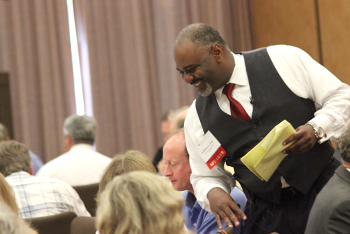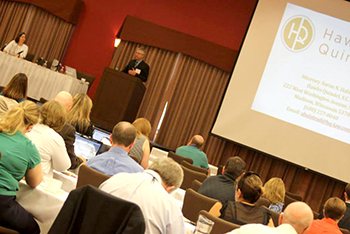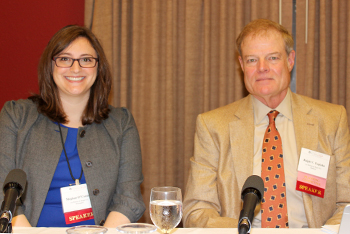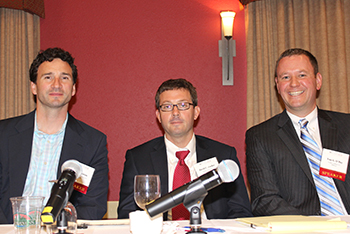
Anthony Gray, a member of the State Bar of Wisconsin’s Board of Governors and President and CEO of the Institute for Global Ethics, interacts with attendees during the luncheon session at the Health, Labor, and Employment Law Institute. Gray explored how attorneys can develop what he calls "Ethical Fitness."

The Health, Labor and Employment Law Institute kicks off with a morning plenary session.
Aug. 22, 2014 – Attorney Anthony Gray, featured speaker at the State Bar of Wisconsin’s Health, Labor and Employment (HLE) Law Institute yesterday, had a few ideas about tackling ethical dilemmas, which attorneys face on a daily basis.
Gray, president and CEO of the Institute for Global Ethics, says ethical decision-making is a practiced skill. With a framework for analyzing ethical dilemmas, attorneys can make better decisions for themselves and their clients when “wading into the unknown.”
The Institute for Global Ethics teaches a framework for that analysis, which can be used by lawyers, business executives, organizational leaders, and government officials. This approach to “ethical fitness” allows decision-makers to reach the heart of the matter.
“This is one way to segment the ethical universe,” said Gray, who previously was a global compliance officer at Sikorsky Aircraft Corp. and practiced law at Day Pitney LLP in Connecticut. “This is not necessarily the only way. It is just a tool to help you pare down the fuzz surrounding the core of the question. The clearer the question, the better the answer will be.”
And good ethical decision-making is more important than ever, Gray says.
<iframe src="//www.youtube.com/embed/RmMyjh0VzO8?rel=0&autohide=1" width="325" height="250" frameborder="0" allowfullscreen></iframe>
Beneath their rules of professional conduct, lawyers share a framework of ethical principles that can help them resolve the toughest ethical dilemma – even when two or more ethical values collide. Anthony Gray of the Institute of Global Ethics explores how attorneys can improve their ethical fitness to make better decisions in the high-stakes legal environment.
“There was a time when not being able to make a sound ethical decision might bring shame to your family or village,” Gray explained. “Technology as a force multiplier in ethics has come to mean that the consequences have become immeasurably larger.”
What is an Ethical Dilemma?
With a charismatic presence, Gray engaged a packed audience at the HLE Institute in Wisconsin Dells. A master’s-level graduate in Ethics from Yale Divinity School and a graduate of U.W. Law School, Gray meandered through the audience posing questions.
“So what is an ethical dilemma?” Gray asked. “An ethical dilemma is when there are two or more of your core values held in dynamic tension, mutually exclusive, but you or your client can only choose one. What do you do then?”
He noted the example of two siblings who work for the same business. One sibling learns that the other is stealing. Does the other sibling choose to tell the truth, upholding the fiduciary duty to the company? Or does the sibling choose family loyalty?

Meghan O’Connor and Ralph Topinka of von Briesen & Roper S.C., Madison, cover recent legislative changes to heath care law in Wisconsin.

From left: Madison attorneys Jason Knutson (Habush Habush, Habush & Rottier S.C.), David Zoeller (Hawks Quindel S.C.), and Tom O’Day (Godfrey & Kahn S.C.) spoke on wage and hour litigation under Wisconsin and federal laws.
Visit the State Bar of Wisconsin’s Facebook page for more photos of this event, or click here.
“Both are good,” said Gray, who is also a member of the State Bar’s Board of Governors and was a judicial intern to Wisconsin Supreme Court Chief Justice Shirley Abrahamson. “The question is which one takes a higher priority?”
Gray also noted what is not an ethical dilemma, including situations involving moral temptation – right versus wrong. For instance, to contemplate the violation of a rule, statute, or otherwise clearly defined boundary is not an ethical dilemma at all.
“They come to you, but you know the answer. In most cases, they knew the answer before they came to you,” Gray said. “They just don’t like the answer.”
Gray noted other tests for detecting situations of right versus wrong, rather than ethical dilemmas, including the professional standards test, the legal test, and the gut test.
“Have you ever looked at an ethical or moral question … and even if you weren’t entirely certain of what the elements of the dilemma were … you just felt that there was something wrong with that situation. That’s the gut or smell test.”
“Would you tell your mom? Would you tell your team, your kids?” Gray asked. If the answer is no, Gray says, you may have a right versus wrong situation.
But what if you do have a true ethical dilemma involving two rights with no clear guidance? Using tools for ethical decision-making can help in those situations. For organizations and businesses that lawyers advise, it can create a positive culture.
Miss the State Bar PINNACLE Health, Labor & Employment Law Institute?
With 15 breakout sessions and featured plenary sessions focusing and health, labor, and employment law, the HLE Institute packed a lot of learning and networking into 1.5 days.
If you missed it, selected sessions, grouped by Health Law sessions and Labor & Employment sessions, will be available via webcast replay on Sept. 8 and Sept. 24, as well as and Oct. 13 and Oct. 29.
Those who registered for the HLE Institute can earn additional CLE credits via webcast replay for free on Sept. 8 and Sept. 24.
Go to the State Bar’s Webcast Calendar to register or browse other programs.
“We provide a framework to either help your firm or your firm’s clients to impact organizational culture,” Gray said. “Every organization that talks about being a high performing organization talks about the impact of culture on organizational success.”
For instance, Gray says making good ethical decisions is not good enough. There must also be a perception that a leader or decision-maker abides by their stated core values.
That perception, Gray noted, is based on the trust that leaders build through procedures and strategies that are communicated and consistently enforced.
“If you follow process and give them something that is transparent, consistent and repeatable, people will accept your decisions, even if they disagree with them,” Gray said. “These are just skill sets. Like any other skill set, it can be learned, and if practiced, you can get better. You can get better at making these decisions.”
Wisconsin Solo & Small Firm Conference
Don’t miss the upcoming 2014 Wisconsin Solo & Small Firm Conference (WSSFC), Oct. 23-25 at the Kalahari Resort and Convention Center in Wisconsin Dells. For more information and to register, visit the WSSFC webpage.
